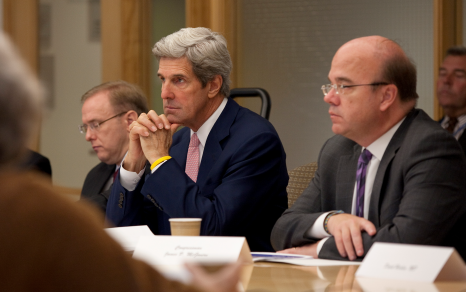Research Means Hope - brings Kerry, McGovern and Langevin to campus

From left, Rhode Island U.S. Rep. Jim Langevin, U.S. Sen. Kerry and U.S. Rep. Jim McGovern met with a group of Medical School leaders as part of the Association of American Medical Colleges (AAMC) national Research Means Hope campaign.
U.S. Sen. John F. Kerry, U.S. Rep. Jim McGovern and Rhode Island U.S. Rep. Jim Langevin came to campus on Thursday, Oct. 28, to meet with some of UMass Chan Medical School's leading researchers as part of the Association of American Medical Colleges (AAMC) national Research Means Hope campaign, which celebrates the fundamental role that National Institutes of Health (NIH)-supported medical research plays in improving human health and longevity.
Kerry challenged the room full of researchers to "connect the dots" more effectively when communicating to the general public how federal grant money makes a difference to the health of the country.
"How can you translate science into a language that people can really understand and get the cause and effect of the investment out there?" Sen. Kerry asked, warning of the anger he is hearing from voters about federal money being invested in research where the outcomes may not be easily understood.
"We are here for a reason. We want to work with you, we do want to make the case," said Chancellor Michael F. Collins. "I believe we are in a position to take a leadership position and the AAMC was very eager to have us have this opportunity to meet with you. This institution is going great places because of the support we receive."
"Scientists and physicians share the impatience of the public to have science make more of an impact on patients lives," said Terence R. Flotte, MD, dean of the T.H. Chan School of Medicine, provost and executive deputy chancellor, the Celia and Isaac Haidak Professor in Medicine and professor of pediatrics and molecular genetics & microbiology, noting that 85 percent of the research done at the Medical School is federally funded. He cited the recent Clinical and Translational Sciences Award that puts the University in an elite consortium of research institutions across the country that are moving lab discoveries into clinical treatment. "As a public institution, we have an obligation to have this work mean something."
The far-ranging discussion touched on stem cell research, the need for public attention on orphan diseases that private industry shuns because of the lack of potential profit, and the question of whether rational people are making decisions based on irrational evidence.
"People are afraid for a lot of reasons. [Medical research] is one area where we still lead the world. And [NIH] investments will help us retain our place," said Walter Ettinger, MD, MBA, president of UMass Memorial Medical Center, professor of medicine and associate vice provost for clinical and population health research.
The NIH invested $164 million in grants for researchers at UMass Chan Medical School in 2009, plus its investment of another $40 million in American Recovery and Reinvestment Act funding, likely yielding $436 million in business activity in the state.
"What we recognize is that scientists and physicians are well respected but there is a communication chasm between bringing science and medicine to people in general. That's something that we traditionally don't do very well," said Shalesh Kaushal, MD, PhD, chair and associate professor of ophthalmology and associate professor of cell biology. "You can see amazing advances in molecular medicine and therapeutics not only on our campus but elsewhere."
"Science doesn't move ahead by a five percent increase each year. Discoveries happen and then all of a sudden, everything is different," said 2006 Nobel Prize Laureate Craig Mello, PhD, Howard Hughes Medical Institute Investigator, the Blais University Chair in Molecular Medicine and distinguished professor of molecular medicine and cell biology. "The message that we have to get out to people is that there are diseases that we know how to cure now, and we are not doing it because we just don't have the money."
Other participants in the roundtable included Joseph Laning, PhD, director of the UMass Chan Stem Cell Bank & Registry, former senior director of cell and analytical biology at ViaCell Inc.; David M. Harlan, MD, the William and Doris Krupp Professor in Medicine and professor of medicine; Stephen Doxsey, PhD, professor of molecular medicine and biochemistry & molecular pharmacology and cell biology; Catarina Kiefe, MD, PhD, chair and professor of quantitative health sciences and professor of medicine; Melissa J. Moore, PhD, Howard Hughes Medical Institute Investigator and professor of biochemistry & molecular pharmacology; and Gary B. Schneider, PhD, professor of molecular medicine.